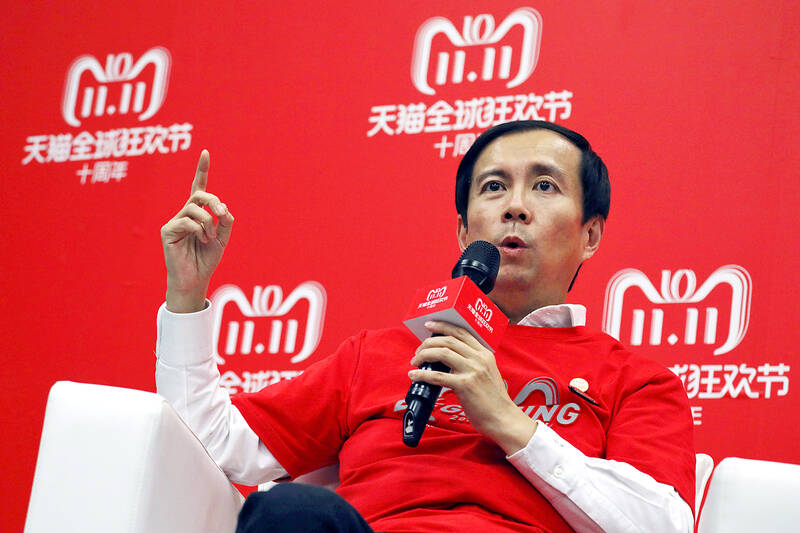The former CEO of Alibaba Group Holding Ltd (阿里巴巴), Daniel Zhang (張勇), yesterday resigned as head of its cloud computing unit as the Chinese e-commerce empire wraps up a leadership reshuffle.
Alibaba said it would invest US$1 billion in a technology fund Zhang would establish to support the firm’s strategies for future growth.
Zhang stepped down on the same day he surrendered his roles as Alibaba’s CEO and chairman.

Photo: AP
In a filing to the Hong Kong stock exchange, Alibaba said that Eddie Wu (吳泳銘) is to replace Zhang as its new CEO and head of its cloud unit. Wu and Alibaba’s new chairman Joseph Tsai (蔡崇信) assumed their new roles by Monday, with Alibaba saying it has “completed its leadership transition.”
Alibaba expressed its “deepest appreciation” to Zhang for his contributions to the company over the past 16 years.
Alibaba’s Hong Kong stock price was down 3.6 percent following yesterday’s announcement.
In an internal letter dated Sunday and viewed by the Associated Press, Tsai wrote that Zhang had “expressed his wish to transition away from his role” as chief of the cloud business, and that the Alibaba board had “respected and accepted Daniel’s decision.”
“Daniel will continue to contribute to Alibaba by channeling his expertise differently,” Tsai wrote.
Alibaba has been restructuring itself into six business units with the aim of eventually listing them to maximize shareholder returns.
In May, the company said it aimed for its cloud unit to be listed within the next 12 months, reaffirming that plan yesterday.
Zhang joined Alibaba in 2007 and created the company’s annual Singles Day online shopping extravaganza. In 2015, he took over from cofounder Jack Ma (馬雲) as Alibaba’s CEO, and succeeded him as chairman in 2019.

Taiwan Semiconductor Manufacturing Co (TSMC, 台積電) would not produce its most advanced technologies in the US next year, Minister of Economic Affairs J.W. Kuo (郭智輝) said yesterday. Kuo made the comment during an appearance at the legislature, hours after the chipmaker announced that it would invest an additional US$100 billion to expand its manufacturing operations in the US. Asked by Taiwan People’s Party Legislator-at-large Chang Chi-kai (張啟楷) if TSMC would allow its most advanced technologies, the yet-to-be-released 2-nanometer and 1.6-nanometer processes, to go to the US in the near term, Kuo denied it. TSMC recently opened its first US factory, which produces 4-nanometer

PROTECTION: The investigation, which takes aim at exporters such as Canada, Germany and Brazil, came days after Trump unveiled tariff hikes on steel and aluminum products US President Donald Trump on Saturday ordered a probe into potential tariffs on lumber imports — a move threatening to stoke trade tensions — while also pushing for a domestic supply boost. Trump signed an executive order instructing US Secretary of Commerce Howard Lutnick to begin an investigation “to determine the effects on the national security of imports of timber, lumber and their derivative products.” The study might result in new tariffs being imposed, which would pile on top of existing levies. The investigation takes aim at exporters like Canada, Germany and Brazil, with White House officials earlier accusing these economies of

Teleperformance SE, the largest call-center operator in the world, is rolling out an artificial intelligence (AI) system that softens English-speaking Indian workers’ accents in real time in a move the company claims would make them more understandable. The technology, called accent translation, coupled with background noise cancelation, is being deployed in call centers in India, where workers provide customer support to some of Teleperformance’s international clients. The company provides outsourced customer support and content moderation to global companies including Apple Inc, ByteDance Ltd’s (字節跳動) TikTok and Samsung Electronics Co Ltd. “When you have an Indian agent on the line, sometimes it’s hard

PROBE CONTINUES: Those accused falsely represented that the chips would not be transferred to a person other than the authorized end users, court papers said Singapore charged three men with fraud in a case local media have linked to the movement of Nvidia’s advanced chips from the city-state to Chinese artificial intelligence (AI) firm DeepSeek (深度求索). The US is investigating if DeepSeek, the Chinese company whose AI model’s performance rocked the tech world in January, has been using US chips that are not allowed to be shipped to China, Reuters reported earlier. The Singapore case is part of a broader police investigation of 22 individuals and companies suspected of false representation, amid concerns that organized AI chip smuggling to China has been tracked out of nations such